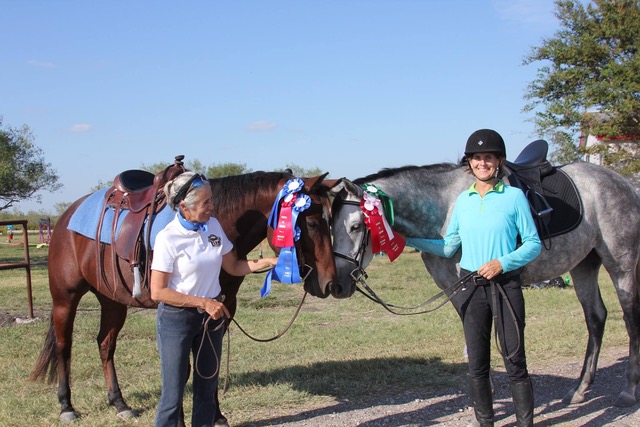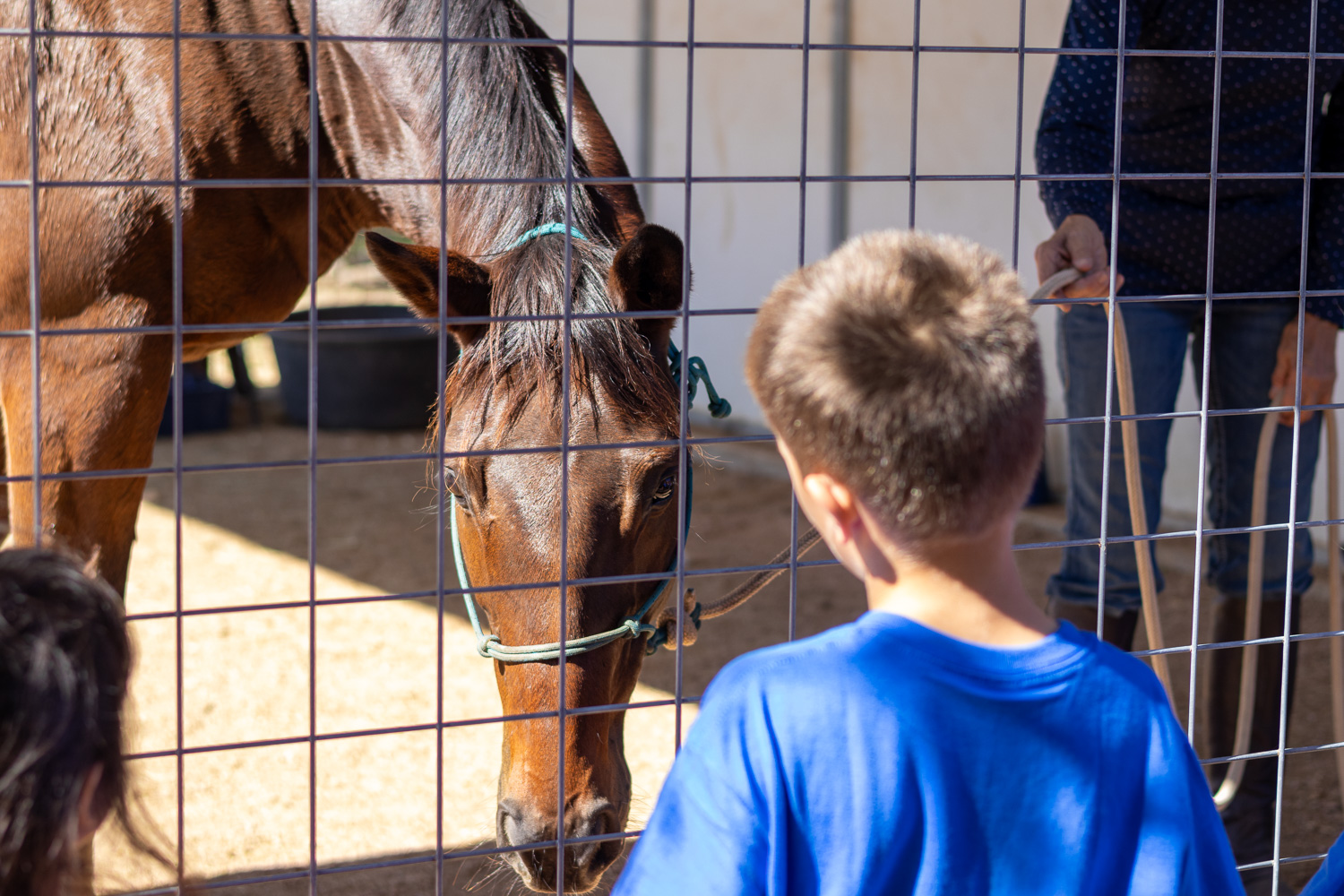For ten years, I’ve been in the horse adoption profession. Before that, I had several years of other horse-related experience — ranging from owning horses, acting as a working student in assorted barns, teaching beginner riding lessons, and exercising horses for pay. As you can imagine, I’ve seen many types of horses, owners, and trainers over that time. And I have come to the conclusion that it is actually is a form of mistreatment to love horses so much that you spoil them.
Most people would assume that a worse equine cruelty would be to physically harm or neglect the horse in obvious ways (such as starvation, abuse or abandonment). Those are indeed indefensible actions and rightly should be condemned (as they are by everyone except the abusers themselves).
It is actually a form of mistreatment to love horses so much that you spoil them.
But there are many more spoiled horses in the world than overtly abused horses. The spoiled horses have no true advocates — few people (other than horsemanship trainers and clinicians) even perceive that these horses might need a group to petition for their better treatment. The people who spoil them rarely receive negative feedback from other equestrians or horse friends — and thus the mishandling continues unchecked in most cases.
Spoiled horses can be dangerous and have the capacity to hurt more people than most types of snarling predators. What’s worse, they have been encouraged and rewarded for their misbehavior by their unsuspecting owners. These horses are frustrated, unhappy, and unbalanced — and they act out from a sense of insecurity and overwhelming need for leadership.
To me, spoiling a horse means that you allow him to consistently behave without respect for people — and that you do this out of a sense of misplaced kindness to your horse. I know many people who pamper their horses by giving them the best vet, farrier and feeding care possible — and whose horses are better “dressed” (in terms of tack, blankets and saddle pads) than the owners themselves.
To me, spoiling a horse means that you allow him to consistently behave without respect for people – and that you do this out of a sense of misplaced kindness to your horse.
But spoiling is a different category than providing high quality care. When a horse is spoiled, the owner has rewarded the horse for evading, resisting, or refusing to perform the basic functions that are required to be a safe, reliable riding horse. Instead of giving the horse leadership and clarity in boundaries, the owner will default to what they believe to be more gentle and humane treatment.
Thus they avoid any interaction in which the horse is corrected and redirected into more appropriate activity. Instead, imaginary emotions are attributed to the horse — and the owner responds to these pretend equine feelings (which prevents the misbehavior from even being perceived, let alone corrected).
So a horse that nips at a coat sleeve is hand fed more grain — because it is seen as “cute” by the owner that he wants his food so badly that he “begs” for it. Or a horse that becomes barn sour and refuses to ride easily to the arena is petted and turned back to the barn — because it is too “stressful” for him to be separated from his buddies. A horse that refuses to stand still for mounting is gently cajoled and coaxed to the mounting block with treats — because he must have had a trauma from an earlier mounting experience and needs loving patience.
The owners of spoiled horses adore their equine pets. They make sure they have the easiest life possible (in the human’s eyes) — their horses are treated like giant, beloved lapdogs. A typical scenario might go something like this:
Is Storm sad? That must be why he is pinning his ears at me when I start to saddle him. Let’s not ask him to work today and get all sweaty in the tack. Leading Storm around the pasture while gently inserting treats in his mouth is a much more humane and enlightened way to bond with him anyway.
Plus it would be kind of scary to ride him when he is sad/angry/depressed/your adjective here — after all, he is telling me something is wrong, so I need to understand that and not ask him to be a good equine citizen (even though the vet says he is perfectly sound to ride).
Besides, we have a deep spiritual connection that transcends the mundane world of saddles. He knows my intention and that’s what counts. In a way, he is kind of like my soul mate/guardian angel/your term here.
The problem with this approach is that 1) it assumes a horse is something that it is not (such as a dog or a child); and 2) it rewards a horse for inappropriate and/or disrespectful behavior. Horses are noble, magnificent animals that inspire and awe me daily. They deserve respect for what they truly are — which is livestock (prey animals with hooves) of the highest order. Horses do have emotional and psychological needs — but those needs aren’t the same as the human equivalent. It is a form of disrespect and dishonor to treat the horse as anything else. And it harms them, sometimes almost to the point of no return.
I have heard several horsemanship clinicians and quality trainers comment repeatedly that the worst horse to deal with is a spoiled horse.
Why is it so cruel to spoil horses? It ultimately can nearly ruin them for any productive work and safe interaction with people. Over time, no matter how compassionate the owner believes their treatment to be, the horse will become insecure, neurotic, erratic, tense, and/or aggressive in nearly every activity that involves a person asking them to do something.
Horses like this have a high chance of then becoming abused or neglected in more obvious ways. They finally bite, kick, buck off, or run over the super nice owner (who has essentially trained them to do that) — and are sold off quickly or given away (thus heading into the lower levels of the horse market with little chance for enlightened ownership).
Sometimes the owners still keep the horses that hurt or frighten them. But they often then become ignored horses — put out in a pasture as being too unpredictable to ride or handle and left there indefinitely. While safer than being sold at an auction or through a “quick sale” Craigslist ad, that is still not much of a life for a proud, athletic animal with heart and intelligence.
The best-case scenario is that the horse will find an owner or trainer who can undo the damage that the incorrect handling and spoiling has created. However, this can be a lengthy process — because a spoiled horse has learned (and internalized deeply) the concept that people aren’t worth much consideration from him. This creates a very significant challenge for a trainer — who must work through the horse’s initially negative reaction to discovering that yes, in fact, people must be respected.
That negative reaction might range from surface irritation and snappish behavior (pinning ears, baring teeth, balking) to misplaced assertiveness on the ground (striking, kicking, biting) to outright aggression under saddle (bucking, rearing, bolting). And it might take days, weeks, or months to work through these issues – depending on each horse’s situation.
Most adult amateurs (who are the majority of horse owners) would find that to be a daunting challenge to take on. Usually a professional horseman is needed to help a horse that has been spoiled to the point where he has begun to intimidate or hurt people.
Over the years, I have heard several horsemanship clinicians and quality trainers comment repeatedly that the worst horse to deal with is a spoiled horse. Most would say that a wild mustang fresh from the range is easier as a training project — because they are simply unacquainted with people (as opposed to contemptuous of them).
I used to be one of those nice, well-intentioned owners. I constantly fed treats to my horses, avoided ever being their leader and loved them to death. Looking back, I am amazed that I lived through that phase.
I say all of this with such confidence because I used to be one of those nice, well-intentioned owners. I constantly fed treats to my horses, avoided ever being their leader and loved them to death. Looking back, I am amazed that I lived through that phase. Although it is embarrassing to admit this, I actually used to thrust a handful of grain into my horses’ mouths right before mounting them.
One horse began rearing regularly during our rides — he had made the connection that I was primarily a treat machine and there was no need to let me stay on his back (where the grain was out of the picture). Who could blame him for such a logical conclusion (from a horse’s perspective)? No amount of petting, hand feeding, astral mind melding or wishful thinking changed the horse’s behavior (nor did any vet exam pinpoint a physical cause). Each ride was scary and full of tense suspense for me — when would he rear and how high?
Finally, I gave up — and rehomed him to a professional trainer who specialized in problem horses and had the skills to deal with the situation. The horse eventually was successfully retrained and found a home with a much more experienced (and non-treat-feeding) rider.
In a very real sense, I came close to permanently damaging that horse — simply because I was inexperienced with horse ownership and proper horsemanship techniques at that time. Of course, I didn’t mean to do that — but I did.
And if you spoil your horse, you will too.






